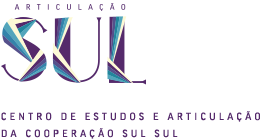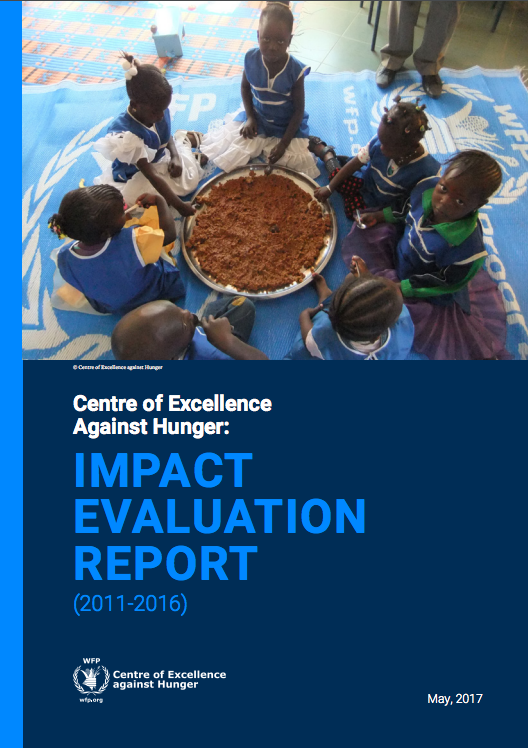
Impact Evaluation report: Centre of Excellence against Hunger
The Centre of Excellence against Hunger, a partnership between the World Food Programme (WFP/UN) and the Brazilian government. It completed, in 2016, five years since its establishment. Over the past years, the Centre has been supporting countries to strengthen their capacities to develop and enhance national initiatives in areas such as social protection, home-grown school feeding, and food and nutrition security, aiming at encouraging innovative, sustainable, and nationally-owned solutions to overcome hunger.
To explore and communicate the lessons learned and the results achieved so far, this external evaluation assessed the degree of achievement of Centre of Excellence’s objectives, the efficiency of its strategies, the quality of its methodologies. It also identified recommendations that can inform future interventions. Since this is Centre’s first evaluation, we have chosen a methodological strategy to give an overall picture of the Centre’s contribution during its five years of existence. Guiding our analysis there is a comprehensive Evaluation Matrix, based on the Centre's Theory of Change, and which encompasses the full range of Centre’s strategies and methodologies, providing the basis for the thorough analysis developed in this report. To enhance data availability for future evaluative endeavours, particular Monitoring & Evaluation recommendations are drawn in the conclusions. In the context of the 2030 Agenda this evaluation also aimed to provide evidence-based information on the contribution of South-South and Triangular cooperation, as well as capacity development interventions, to attaining the Sustainable Development Goals (SDGs).
The impact evaluation covers the period from 2011 to 2016 and was carried out in partnership with MOVE Social. Parallel to the evaluation process, we have supported the Centre of Excellence in strengthening its M&E system. In that sense, we have designed a Monitoring, Evaluation and Learning system to be implemented by the Centre in the years to come.
Read it here
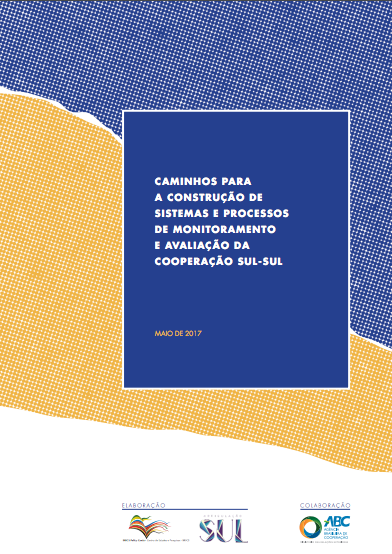
Paths for Developing South-South Cooperation Monitoring and Evaluation Systems
This document is based on the “Dialogues on Brazilian South-South Cooperation” held in Rio de Janeiro, in January 2017. The publication reflects debates among government, academics and civil society from different developing countries. The authors present ideas about specific issues on South-South cooperation (SSC), in order to subsidize the construction of evaluation and monitoring systems that take into account SSC practices and contexts. South-South technical cooperation evaluation that helps to generating relevant evidence on capacity development and knowledge sharing can make a decisive contribution to distinguish it from other experiences in the field of international development cooperation. In addition, building more accurate and adherent indicators to South-South practices should contribute to a more favorable environment for capacity building and knowledge exchange.
Read it here.
BRICS Policy Center; Articulação Sul. Paths for Developing South-South Cooperation Monitoring and Evaluation Systems. Brasília: Ministry of Foreign Affairs, 1ª ed., 2017.
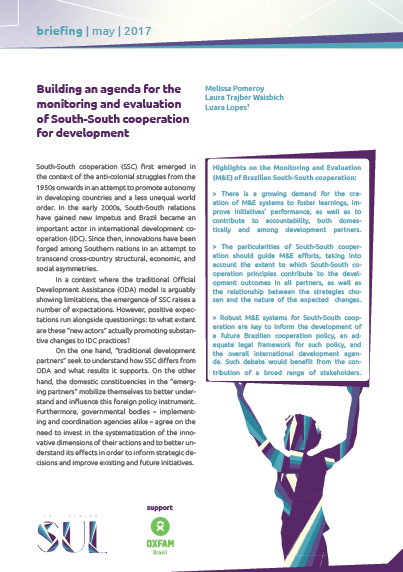
Building an agenda for the monitoring and evaluation of South-South cooperation for development
This new edition of 'Briefing' discusses South-South cooperation (SSC) monitoring and evaluation, considering the Brazilian experience. Nowadays, there is a growing demand for the creation of monitoring and evaluation (M&E) systems that facilitate learning, support the improvement of initiatives and contribute to domestic and peer accountability. The paper points to the importance of M&E practices that recognize and absorb, conceptually and practically, the singularities of South-South cooperation, such as its principles and approaches.
In addition, robust M&E practices have the potential to inform the international development agenda, and in the Brazilian case, the building of a future technical cooperation policy. Finally, the text points out recommendations to strengthen the M&E of SSC.
Read it here.
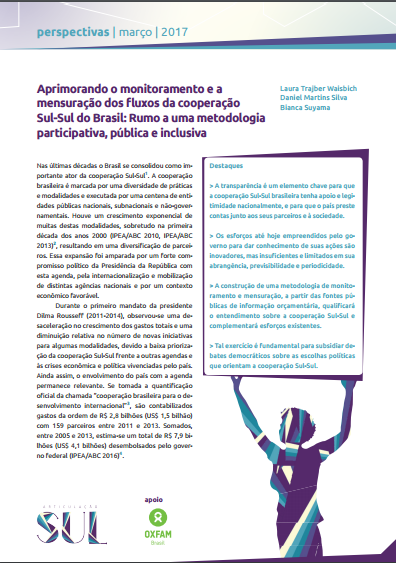
Monitoring and Measuring of South-South Cooperation Flows in Brazil
Information transparency is a key element for Brazil’s South-South cooperation initiatives to garner national support and legitimacy and for the country to be accountable to its partners and to society. Due to this, the first edition of "Briefing" points a new debate: use of public information systems to understand and make visible Brazilian South-South cooperation. Data, nowaday available for public consultation are sufficient? Measuring initiatives of South-South cooperation circumscribe singularities of Brazilian proceedings? To what extent is possible the use of budgetary informations in order to complement these efforts?
Read it here
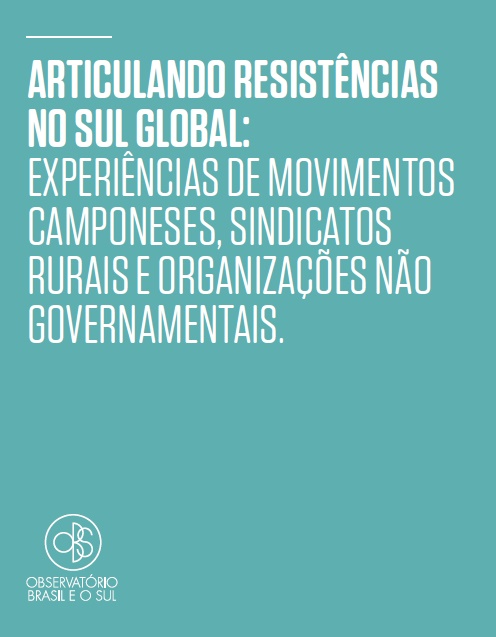
Articulating Resistances at Global South: experiences from peasant movements, rural unions and non-governamental organizations
This publication identify and discuss the transnational experiences of Brazilian social actors related to agrarian and agrofood system issues, as peasant movements, rural unions and non-governamental organizations. The following movements and organizations were partners of this process: Farmer Women Movement (MMC), Small Farmer Movement (MPA), National Confederation of Agriculture Workers (CONTAG), FASE, INESC, IBASE (NGO’s), the Brazilian Network of Environment Justice and Brazilian Forum of Food Security and Sovereignty (FBSSAN). This study was supported by Oxfam Brazil.
POMEROY, Melissa; SILVA, Daniel Martins. Articulating Resistances at Global South: experiences from peasant movements, rural unions and non-governamental organizations. São Paulo: Oxfam Brazil, 2017.
Read it here.
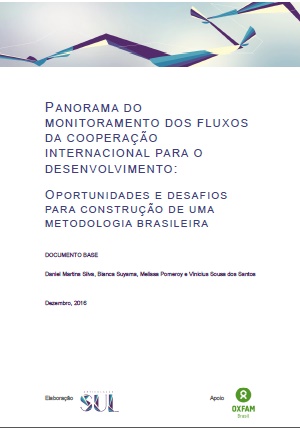
Overview of Monitoring International Development Cooperation Flows: opportunities and challenges for building a Brazilian methodology
This report presents and discuss the main contemporary methodologies of measurement on international cooperation for development (including North-South and South-South cooperation). Aiming to build a monitoring system for international development flows through public budget were raised the main characteristics, critics and discussions about this methodologies. We focus on three central points: modalities (nature of the flows); instruments (mechanisms of which cooperation is developed) and unity of measurement (which indicators are used for measurement). The research was supported by Oxfam Brazil.
Read it here
SILVA, Daniel Martins; SUYAMA, Bianca; POMEROY, Melissa; SANTOS, Vinicius Sousa dos. Overview of monitoring international development cooperation flows: opportunities and challenges for building a Brazilian methodology. São Paulo: Articulação Sul, 2016.
Triangular cooperation in social protection: lessons from Brazil for the 2030 agenda
This paper, commissioned by the UN Office for South-South Cooperation (UNOSSC), aims to explore the lessons learned through Brazilian TrC in social protection and their potential contribution to the 2030 agenda. The first section of the paper briefly describes the evolution of the social protection debate in development cooperation, followed by overall picture of Brazilian TrC. The third section presents the three initiatives: the Purchase for Africa from Africans, the World Without Poverty Platform and the Programme to eradicate child labour. The final section concludes by putting forward possible contributions of Brazilian TrC in social protection to the 2030 agenda.
Authors: Bianca Suyama, Marina Caixeta and Gustavo Macedo
Suyama, B; Caixeta, M; and G. Macedo (2016) Triangular cooperation in social protection and food security: lessons from Brazil for the post 2015 agenda. UN SSC Discussion paper. New York: UNDP.

Monitoring and Evaluation Mechanisms for South-South and Triangular Cooperation: Lessons from Brazil for the 2030 Agenda
This paper, commissioned by the UN Office for South-South Cooperation (UNOSSC), and developed by Articulação Sul, Instituto de Pesquisas Econômicas Aplicadas (IPEA), Centro Brasileiro de Relações Internacionais (CEBRI) and BRICS Policy Center (BPC), aims to (a) map out what has been done so far in M&E by the institutions executing SSDC/TrC in the country; (b) understand how the main stakeholders perceived Brazilian SSC/TrC M&E and particularly its conception and application of SSC principles, measuring process, results and impact, innovative approaches; (c) analyse lessons to inform policies and practices of the development community; and (d) contribute to global initiatives and debates that aim to build better M&E frameworks for SSDC/TrC, including efforts promoted by the Network of Southern Think Tanks (NeST).
Articulação Sul, IPEA, CEBRI, BRICS Policy Center. Monitoring and Evaluation Mechanisms for South-South and Triangular Cooperation: Lessons from Brazil for the 2030 Agenda. New York, UNDP, 2016
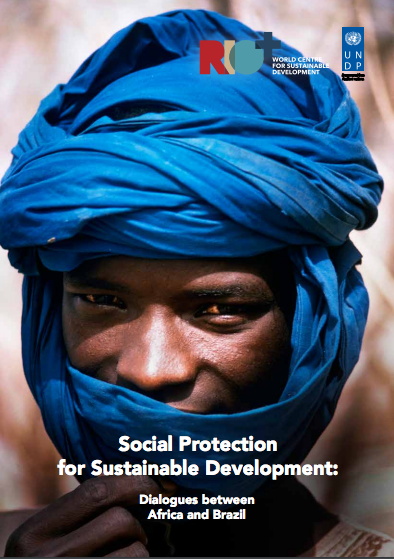
Brazil-Africa Cooperation on Food and Nutrition Security: Planting seeds in unfamiliar soil
The current context of development cooperation is characterized by the transition from emergency food aid to efforts to develop national programmes on access to food, redefine the strategies of international organizations and strengthen ties between agriculture, nutrition and social protection - some of them with a focus on building national programmes capable of linking access to food production. External and internal factors in Brazil are resulting in growing attention to Brazilian food and nutritional security programmes (PAA and PNAE) in global policy spaces and similar programmes being adopted in African countries. Due to the institutional specificities of Brazilian South-South cooperation, these programmes are implemented through trilateral arrangements with international organizations. To analyze the potentials and challenges of "policy transfer" in this sector and possible paths for strengthening South-South cooperation, this article will explore the lessons learned thus far in the implementation of these programmes.
Authors: Mariana Santarelli and Bianca Suyama
Santarelli, M; and B. Suyama (2016) Brazilian food and nutritional security in Africa: Planting seeds in unfamiliar soil. In Social Protection for Sustainable Development: Dialogues between Africa and Brazil. Rio de Janeiro: UNDP World Centre for Sustainable Development (RIO+ Centre)
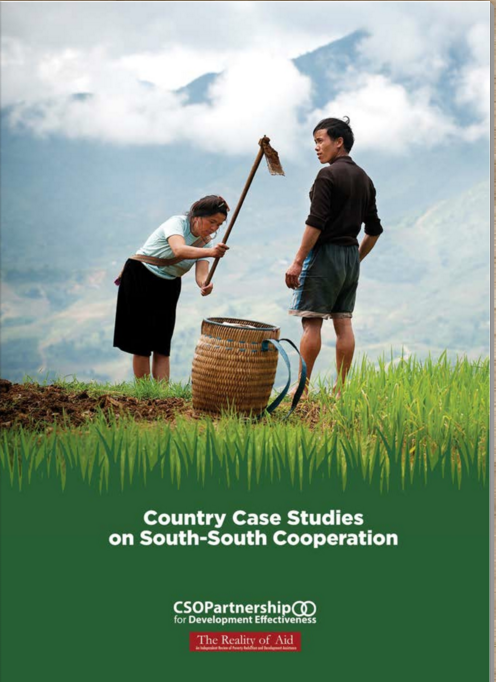
Country case studies on South-South Cooperation
"Country case studies on South-South Cooperation" on-line book. It includes analyses of South-South cooperation in Argentina, Cuba, Brazil, Kenya, India, Nepal, BRICS and Africa and Nigeria. Published by Reality of Aid and CSOs Partnership for Effective Development. Articulação Sul contributed with the Brazilian chapter.
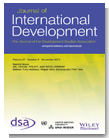
Brazilian South–South Development Cooperation: The Case of the Ministry of Social Development in Africa
The article analyses domestic and external drivers of the rise of South–South development cooperation to a foreign policy priority under the Lula administrations. It argues that the rise was a consequence of presidential leadership, growing domestic mobilisation, shifts in the global political economy and the prioritisation of South–South development cooperation by traditional donors. It explores the case of the Ministry of Social Development cooperation with Africa, focusing on two experiences—the Bolsa Família and the Purchase from Africans for Africa Programme. Although the ministry's partnership with traditional donors remained constant, there was increased domestic leadership in the food purchase programme.
Authors: Iara Leite, Melissa Pomeroy e Bianca Suyama
© 2015 UNU-WIDER. Journal of International Development published by John Wiley & Sons, Ltd.
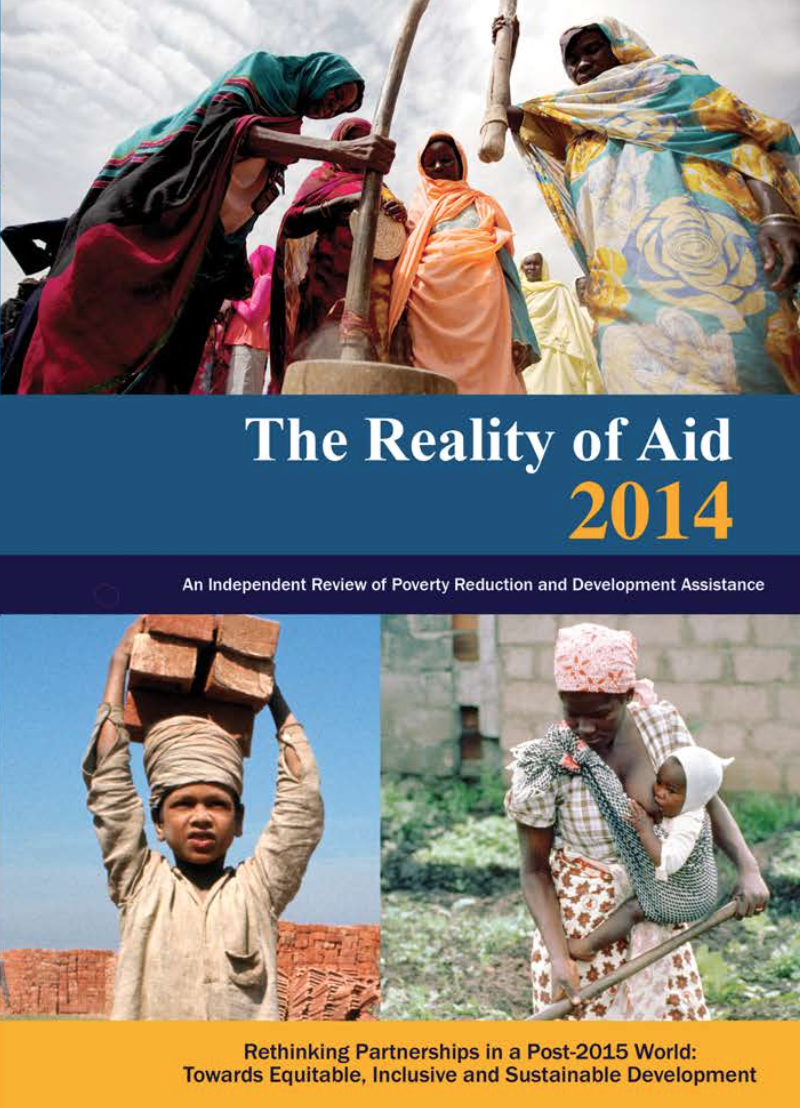
Picking and Choosing: Contributions of Brazilian cooperation to more horizontal post-2015 partnerships
This article discusses how Brazil could contribute to a more horizontal form of development cooperation based in a proposal for structural and procedural changes to boost post-2015 development.
Authors: Bianca Suyama and Melissa Pomeroy
Published in: "Rethinking Partnerships in a Post-2015 World: Towards Equitable, Inclusive and Sustainable Development." Reality of Aid 2014 Report. IBON International. Quezon City: 2014. pp. 188-195.
Read it here

Brazil’s Engagement in International Development Cooperation: The State of the Debate
The reports aims to provide a snapshot of interests, institutions and ideas, including narratives and policy debates, relating to Brazil’s engagement in South-South Cooperation (mainly focusing on technical cooperation).
Authors: Iara Costa Leite, Bianca Suyama, Laura Waisbich, Melissa Pomeroy
Publishers: Institute of Development Studies, Centro Brasileiro de Análise e Planejamento, Articulação Sul

Supporting ‘Autonomy and Resistance’: The Brazil-Mozambique-South Africa native seed bank project
The study addresses the "Project Seed Bank Native Brazil-Mozambique-South Africa", an interesting case of South-South cooperation led by civil society actors and rural movements of these three countries that seeks to promote food sovereignty.
The Institute of Development Studies policy brief "Innovation, solidarity and South-South learning", which draws on this and other civil-society led South-South cooperation projects, can also be found below.
Published by the Institute of Development Studies/Articulação Sul. The Role of Civil Society in South-South Cooperation, Case study 4.
Authors: Bianca Suyama and Melissa Pomeroy
Read the study here and the policy brief here.

Políticas de Cooperação Internacional para o Desenvolvimento no Norte e no Sul: que lições e desafios para o Brasil
The article's main objective is to contribute to the debate about the foreign policy agendas in Brazil, particularly with regard to the International Development Cooperation (IDC) system, in which the Brazilian government and its various agencies have also played an increasing role as a country offering cooperation projects (IPEA, 2010 and 2013). Within the IDC, Brazil traditionally played the role of beneficiary of programs and funding. From the 2000s on, along with the increase in the scale of Brazil's foreign policy, its role in IDC also changed. Brazil has participated in cooperation programs for development in other middle-income countries and low-income countries since the 1960s. However, it was not until the 2000s that their role has become more dense in quantitative and qualitative terms.
Authors: Carlos Milani, Bianca Suyama and Luara Lopes
Published by Friedrich Ebert Foundation, Brazil, 2013
Read it here. (Portuguese)

A sociedade civil global e o desenvolvimento pós-2015
The article discusses civil society's engagement in the key processes of the current international development agenda, including the review of the Millennium Development Goals, the negotiation of Sustainable Development Goals and the construction of a new post-2015 global framework.
Published in "Caminhos do futuro" Vol.3, CEBRI
Read it here. (Portuguese)
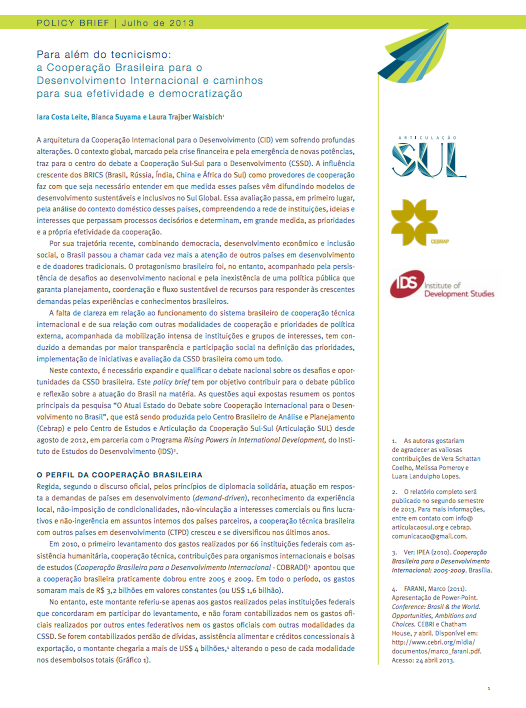
Para além do tecnicismo: A cooperação brasileira para o desenvolvimento internacional e caminhos para sua efetividade e democratização
Due to its recent trajectory, combining democracy, economic development and social inclusion, Brazil began to draw increasing attention from other developing countries and traditional donors. Brazil's role was, however, accompanied by the lingering challenges to domestic development and the lack of a policy to ensure public planning, coordination and a sustainable flow of resources to meet increasing demands for Brazilian experiences and knowledge.
Authors: Iara Leite, Bianca Suyama and Laura Trajber Waisbich
Published by Cebrap/IDS/Articulação Sul
Read it here.

Africa-Brazil cooperation in social protection: Drivers, lessons and shifts in the engagement of the Brazilian Ministry of Social Development
The Brazilian Ministry of Social Development’s co-operation with sub-Saharan Africa has shifted from an initial engagement in cash transfers to a recent engagement in food and nutritional security. This paper aims at understanding the main drivers for such shift considering lessons drawn from first initiatives and from growing involvement in South-South Development Cooperation, as well as changes in the mobilization of domestic coalitions in Brazil. By doing so this paper aims at contributing to the international debate on the effectiveness of South-South Development Cooperation, unpacking challenges and opportunities faced by developing countries when allocating growing domestic human and financial resources to promote international development.
Authors: Iara Leite, Bianca Suyama and Melissa Pomeroy
Published by UNU-WIDER, March 2013
Read it here

Emerging brazilian cooperation: Reflections on its parameters and public-private boundaries
Focusing on Brazil’s presence in Africa, this article discusses the boundaries between Brazil’s role as a donor in International Development Cooperation and its business relationships.
Authors: Vera Masagão, Bianca Suyama, and Luara Lopes
Published in “Aid and the Private Sector: Catalysing Poverty Reduction and Development? Pp. 153–60. Brian Tomlinson (ed.), Reality of Aid 2012 Report. Quezon City: IBON Books, 2012.
Find it here.

Reinventando a Cooperação Internacional para o Desenvolvimento: Incluindo a sociedade civil
The article discusses how civil society can contribute to the redesign of the International Development Cooperation's architecture.
Authors: Bianca Suyama and Luara Lopes
Posted in Rede de Humanização do Desenvolvimento N.2, September 2012. Pp. 39-42.
Read it here. (Portuguese)

From Transfers to Equal Exchange: Advancing the Role of Southern Knowledge in International Development Cooperation
This article is about the role of southern Knowledge Based Organisations (KBOs) in shaping and influencing international development cooperation, focusing on Brazilian KBOs.
"The role of KBOs is not confined to informing the government. Part of their task is to work with the media, universities and civil society organisations to expand and qualify the debate, based on evidence. They have also become important actors in formulating and expanding the global discourse on development, inequality, climate change etc. Although KBOs are just one of a variety of civil society actors, they often become representatives of civil society in global policymaking, ensuring excluded voices influence international policymaking."
Authors: Bianca Suyama and Iara Leite
Published in Poverty in focus magazine Number 24, pp. 38-40
Read it here.
Centro de Estudos e Articulação da Cooperação Sul-Sul
Av. Dr. Arnaldo, 1566 - São Paulo - SP - Brasil - CEP: 01255-000 - Telefone + 55 (11) 5643 0702
Av. Dr. Arnaldo, 1566 - São Paulo - SP - Brasil - CEP: 01255-000 - Telefone + 55 (11) 5643 0702
